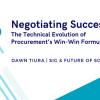In today’s fast-paced business environment, sourcing and procurement departments are often left in a difficult position; they are required to become quicker and more proficient when it comes to sourcing the essential direct and indirect materials their companies need to do business, but saddled with a source-to-settle process filled with risks and inefficiencies.
Currently, securing a vendor is a multi-step process that is not only time-consuming, but also opens the business up to risk and leakage. In a typical situation, the buyer begins the process by issuing an RFx (Request for: information, proposal, quote or bid), and then evaluates vendors who in turn respond on two main criteria: technical and commercial capabilities. Finally, they negotiate a contract and, hopefully, agree on terms.
The current sourcing paradigm is falling short of modern business needs, costing enterprises precious time and money. The first problem lies in non-compliance with internal company standards, which can be attributed to disconnected contract management processes. Such a divide can also be a major source of leakage for companies – McKinsey and Company estimates that about 3.5 percent of spend is lost in the source-to-settle business process.
Second, without a clear means or solution to manage contracts, many are often introduced too late. Typically, only after a letter of intent (LOI) is issued does contract language begin to be negotiated. This means that the negotiation process of additional clauses between buyer and seller can slow or even derail the sourcing process. By introducing contracts at the very beginning, when clauses are agreed upon from the start of any discussion or negotiation, long delays can be prevented,
Another roadblock can be a lack of visibility into and understanding of contract performance. As part of any procurement decision, it is normal for an organisation to review a contract’s past performance. However, the data to uncover these critical insights can often be scattered across an organisation and not easily accessible, causing delays in the process.
The old processes that have long been accepted as the standard, can quickly become a liability as the pace of commerce accelerates. Making sourcing a contract-centric process though, presents a real opportunity for organisations to take control of their sourcing. Contract-centric sourcing is the new paradigm that enables sourcing organisations to both accelerate their buying processes, improve compliance and reducing leakage. By combining digital contracts and processes with artificial intelligence, companies can transform the foundation of their sourcing process.
This has many advantages, which address some of the key pain points and inefficiencies that plague companies running legacy or non-digital sourcing processes. By making contract compliance the third pillar by which vendors are evaluated alongside technical and commercial capabilities and introducing contracts at the very beginning of the sourcing process, businesses can better ensure compliance with buying standards, accelerate sourcing evaluations and gain visibility into past contract performance data. This in turn enables enterprises to create a category strategy that will deliver the most long-term benefits to the company.
The process works as a follows: the buyer crafts the right RFx for their business needs to present to prospective vendors via a digital contract management platform, complete with the contract language they would like to agree on. The vendor then redlines the contract based on their own needs and requirements and the two parties are then able to negotiate.
The benefit is that buyers are able to evaluate how much contract negotiation will be required before choosing a preferred vendor and issuing an LOI. And with the help of artificial intelligence, the buyers can compare vendor redlines and determine which represent acceptable changes and which are red flags. Connecting this process to past contracting and negotiation data allows buyers to get the best results from their sourcing efforts. The core benefit of the whole process is visibility.
By making contracts central to RFx and selection processes, businesses can bring the contract negotiation data and other vendor information to one easily accessible, central platform, as opposed to it being spread out across multiple email inboxes and in different departments and organisations. Sourcing departments that integrate contract management benefit by gaining a huge wealth of data about a vendor’s past negotiation strategy and behaviour, in addition to how well they perform against contract language. This is powerful data that hasn’t been fully leveraged in the current paradigm, now available in one place.
The business world is changing. It’s no longer enough for procurement organisations to balance risk with accelerating business; they need to find ways to actually reduce risk and accelerate the pace of business themselves. Contract-centric sourcing provides a new approach that drives value and improves efficiency of the sourcing process.
Region:









